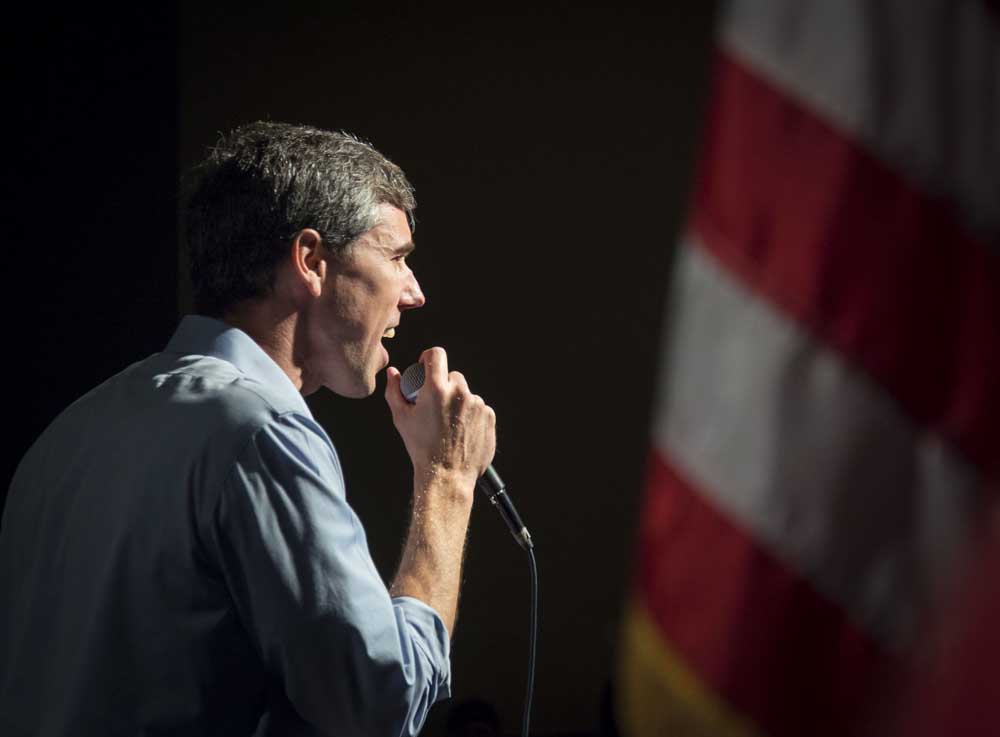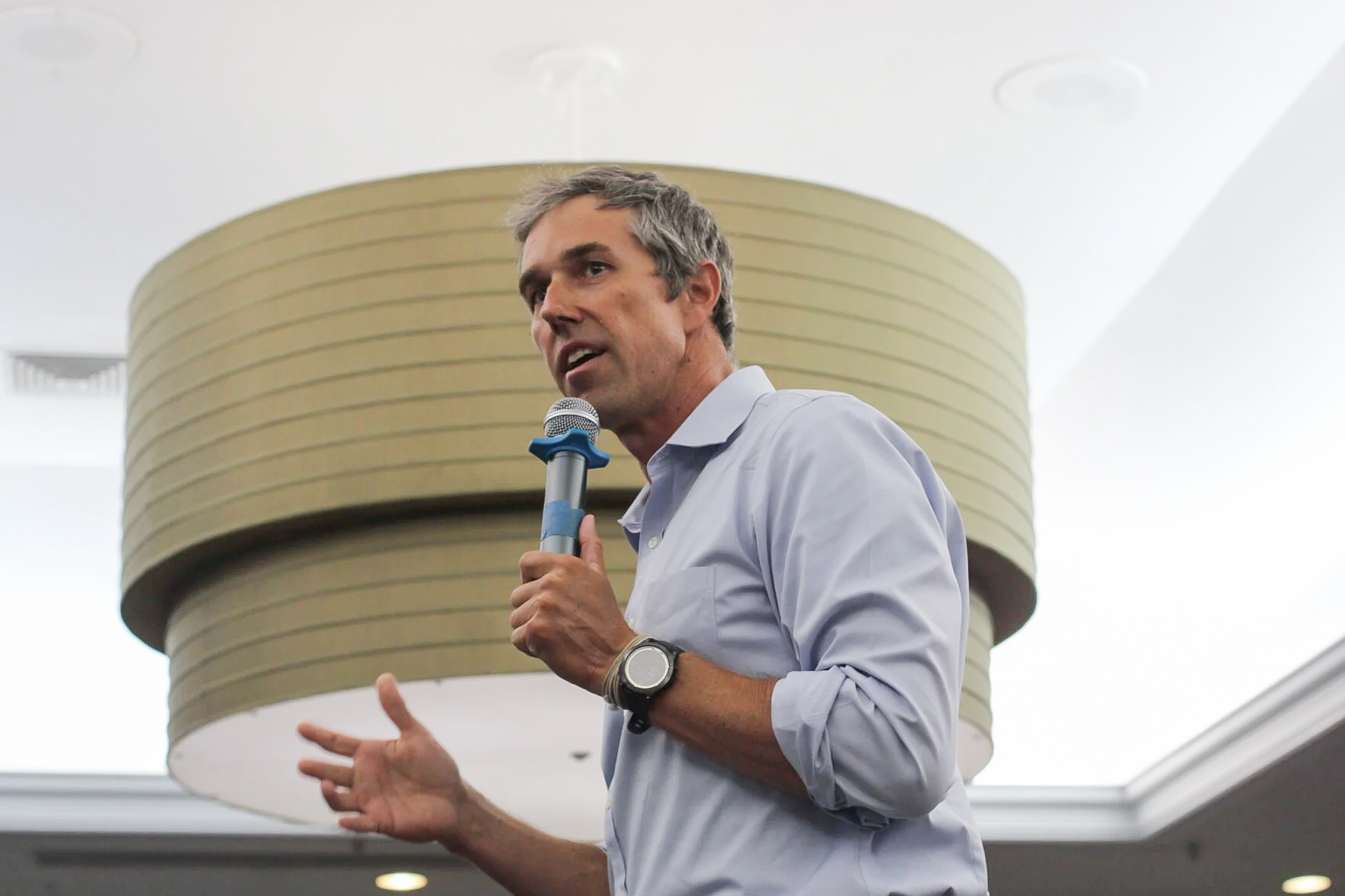Beto O’Rourke enters 2022 a weaker candidate with a harder race
Published 6:00 pm Monday, November 15, 2021

- Beto O’Rourke makes a campaign stop in October 2018 at the Longview Community Center. O’Rourke on Monday announced he is challenging Gov. Greg Abbott in the Texas governor race.
Four years ago, a little-known Democratic congressman from El Paso named Beto O’Rourke announced he was running for U.S. Senate, challenging Republican incumbent Ted Cruz.
O’Rourke got started early, launching more than a year and a half before the general election. At the time, a majority of voters told pollsters they were unfamiliar with him. And perhaps for that reason, the incumbent virtually ignored him for 11 months, as O’Rourke began to tour all 254 counties in Texas, built an electrifying campaign that captured the nation’s attention and ultimately came within 3 percentage points of Cruz.
He had the wind at his back as the country delivered a blue wave in rebellion against President Donald Trump’s first two years in office.
And in the process, O’Rourke became the new star of a Texas Democratic Party that desperately needed one, smashing fundraising records, energizing young people and attracting a healthy amount of GOP defectors. Even his defeat was treated as a kind of victory by Democrats as the “Beto wave” swept their other candidates into office down the ballot.
This time, O’Rourke’s statewide campaign is starting in a completely different place.
His run against Gov. Greg Abbott, which he announced Monday, is starting 229 days later than his U.S. Senate campaign did in 2017. O’Rourke is now well known statewide — and polls show more Texas voters have a negative view of him than a positive one. And Abbott’s not giving him a pass, regularly rallying Republicans against him on the campaign trail and releasing videos attacking him.
Hector Garza, deputy county chair for the Smith County Democratic Party, said O’Rourke’s announcement was welcome news.
“We in a sense knew he was going to run, we hoped he was going to run. Until he made it official we just kept waiting, but they say good things come to those who wait and Texas has waited long enough,” Garza said in an interview with the Tyler Paper and News-Journal.
Garza said O’Rourke should have a “huge following with the younger crowd,” and those young voters are what could “tip the balance.”
“He’s a candidate that cares about the smaller folk, not just your big metropolitan cities,” Garza said, adding he’s looking forward to changes O’Rourke wants to make on infrastructure, education, healthcare and more.
Gregg County Republican Party Chairman Brian Bowden said O’Rourke “has never held a conservative viewpoint in his life as an elected official.”
“He has lost the last three races he has entered because his liberal viewpoints do not sit well with Texans,” Bowden said in a statement to the Tyler Paper and Longview News-Journal. “Part of his plan this election is run ads that contrast he and Gov. Abbott. Republicans strongly encourage this because we believe that Texans want and believe in conservative issues like Second Amendment, abortion, supporting our police and first responders, good paying jobs, supports closing the border, and election integrity.
“Many of these issues make up the Republican legislative priorities we set forth this year and were very successful getting bills passed to make sure our conservative principles are upheld.”
This time, national politics will not play in his favor. Trump is out of office, President Joe Biden is deeply unpopular in Texas and Democrats are expecting to take a beating in the midterm elections nationwide.
Meanwhile, O’Rourke’s shine has dulled considerably after an unsuccessful presidential campaign during which he took positions that could be politically perilous in Texas.
“The dynamics are just much more different, and the climate’s totally different,” said Nick Maddux, a Texas Republican strategist who worked on Cruz’s 2018 campaign.
Of course, Abbott is also not in the same position he was the last time he was on the statewide ballot four years ago, when his race was an afterthought compared to Cruz’s. After navigating the coronavirus pandemic, February’s winter weather disaster and a series of contentious legislative sessions, the governor’s approval rating has sunk to the lowest it has been since he took office in 2014.
One of O’Rourke’s top goals, Democrats agree, should be to ensure the race is a referendum on Abbott, who this year ushered through some of the most conservative laws — on abortion, guns and voting — in recent Texas memory.
Abbott’s campaign is already trying to make the contest about O’Rourke, branding him “Wrong Way O’Rourke” and spotlighting comments in which he has tacked to the left since the 2018 race.
“He clearly keeps running more to the left and he stands at the extreme left wing of his party as of today,” Abbott campaign spokesperson Mark Miner said. “Now he’ll try to reinvent himself, but he can’t run from his past.”
After O’Rourke’s Senate campaign, presidential campaign and starring role in the 2020 election in Texas — and all the GOP attacks that have accompanied each endeavor — O’Rourke’s image in the state is damaged.
In the span of four years of polling from the University of Texas and The Texas Tribune, O’Rourke went from a politician that 55% of voters said they were unfamiliar with to one that only 7% said they were unfamiliar with. In the latest survey, conducted late last month, 35% of voters rated O’Rourke favorably, while 50% rated him unfavorably.
“Everyone has an opinion of Beto O’Rourke — and it’s upside down,” said Maddux, the Cruz strategist.
At the same time, Abbott has found himself at one of the most vulnerable points in his governorship. Two months ago, the same poll gave Abbott his highest disapproval rating — 50%. It ticked down to 48% in the latest survey.
For those reasons, Democrats hope O’Rourke can keep the focus on Abbott and the governor’s response to the electric grid failure and coronavirus pandemic.
Whether — and how much — to go after the incumbent was a hotly debated topic in O’Rourke’s 2018 race, and O’Rourke grappled with it for months before deciding to launch anti-Cruz ads in the closing weeks of the contest. He does not appear to be hesitating this time.
“I want to make sure that the people of Texas understand the choice before us,” O’Rourke said in an interview with the Tribune. Asked if that means he will run ads that provide a contrast with Abbott, O’Rourke replied, “Absolutely.”
Michael Tolbert, chair of the Smith County Democratic Party in deep-red East Texas, said O’Rourke has “good instincts, and I believe part of his success in his Senate campaign was that he relied on his instincts.” But when it comes to guns, Tolbert added, O’Rourke “needs to do his research to find out what Texans think and feel.”
“If he wants to come hunting in East Texas, I would be happy to train him, go hunting with him, kind of let him see that’s part of the culture here,” Tolbert said. “Yes, we do believe there needs to be more background checks, more gun safety, but there’s gotta be a way to do it without going too far to the extreme.”
The differences for O’Rourke are not all negative. After all his work in the 2020 election, Texas Democrats now see him as much more of a team player, a far cry from the 2018 candidate who did not always seem comfortable with the intraparty responsibilities that came with leading the statewide ticket.
O’Rourke is also running in a different campaign finance system at the state level — one that allows unlimited donations to candidates. That will be key if O’Rourke wants to have any chance of catching up to Abbott’s overwhelming campaign war chest, which stood at $55 million at the end of June. He confirmed in the interview that he will accept unlimited donations.
O’Rourke was otherwise restrained in discussing how he is approaching this campaign differently from his 2018 run, repeatedly saying his strategy would be informed by what Texans are telling him.
“If I have any chance of winning this,” he said, “I’ve got to listen to, trust, work with the people of Texas.”
(Maleri McHam contributed to this story, which originally ran in the Texas Tribune. It has been edited for length.)







